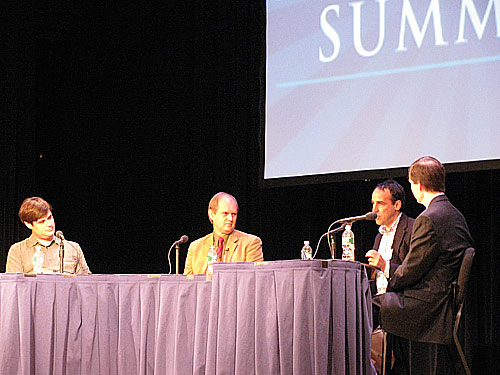
Day two of the 2009 Singularity Summit is back underway here in New York. They front-loaded the summit today with short talks by smaller-name speakers on topics that were pretty peripheral to the Singularity. Typical setup for a conference, but I decided to spare my sanity by skipping those first few.
Just starting now is a panel discussion on the “Future of Scientific Method,” with the last three speakers, Gary Wolf, Michael Nielsen, and Robin Hanson, and moderated by James Jorasch.

[From left: Michael Nielsen, Robin Hanson, Gary Wolf, and moderator James Jorasch]
Jorasch asks if scientists should still be doing science, rather than just dedicating their efforts to achieving A.I. (in light, presumably, of the fact that Our Very Existence Depends Upon It). Michael Nielsen says, you’re right, most scientists don’t have any skills to contribute to A.I. Jorasch suggests that we retrain them — to rapturous applause from the audience.
Jorasch then asks if we should want all of the changes that the conferencegoers expect the future to bring. Gary Wolf, making what you might call a “Determinist-Lite” argument, says that our moral beliefs about whether technological change is good don’t matter for much, because as long as someone finds that there’s something in it for themselves, technological change is unstoppable. (Unless I misread Wolf’s tone, this statement wasn’t intended as a criticism or warning.)
They’re talking now about current systems that augment us. Jorasch talks about how he used an iPhone app last night to monitor how much sleep he got (6.5 hours) and asks, isn’t this turning me into more of a robot? Robin Hanson says, “That’s called civilization,” to scattered laughs and applause. Uh… ba-da-bing? We’ve built civilization on technology, he says. I guess Rome fell for lack of apps.
The panelists are talking now about centralization and coordination in scientific research. Jorasch seems to think it’s a problem that there isn’t more coordination among scientists, because redundant work is going on. Hanson answers this the same way he has every other question, with a knowing (and a touch snide) little smile and an assertion that the system works. Hanson is taking a weirdly defensive stance to all of these questions. Portions of the audience have been quite supportive of the “takedown” stance Hanson’s been taking, but I think Michael Nielsen, gracious and poised, is the far more effective speaker here.
Audience questions now. One guy notes that almost everyone here is an adult, and he asks how we can do more to get young kids trained in avoiding all of this messy competition we see now in the scientific world. (Soviet-style central planning, anyone?) Gary Wolf says that he seems to have found that competition is a natural thing, that you get in any sort of setup of scientific research, and that it even seems to spur new research and advances. Well, whaddya know. And that’s a wrap on the panel.

Futurisms
October 4, 2009